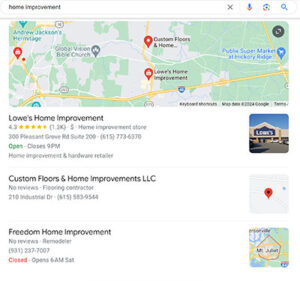- Local SEO is critical for any business that operates on a regional level. While general SEO focuses on ranking in searches nationwide, local SEO prioritizes appearing on search engine results pages in a specific location.
- Businesses looking to stay competitive need to understand the significance of local Search, specifically focusing on components like Google Maps, NAP (Name, Address, Phone Number) consistency, and more.
- Integrating local keywords into your website’s content, titles, and meta descriptions is essential. Keywords should reflect the local vernacular and address the local audience’s needs directly.

Local search engine optimization (SEO) is crucial for businesses that want to capture customers’ attention in their vicinity. Businesses looking to stay competitive need to understand the significance of local search engine optimization, specifically focusing on components like Google Maps, NAP (Name, Address, Phone Number) consistency, and more.
Local SEO is critical for any business that operates on a regional level. While general SEO focuses on ranking in searches nationwide, local SEO prioritizes appearing on search engine results pages (SERPs) in a specific location. This strategy relies on marketing your brand, products, and services to regional leads and customers.
Mastering Local Search: A Strategic Guide to Ranking Higher
Here are seven actionable tips to help businesses effectively enhance their local search rankings and why it’s the key to staying competitive. Local SearSearchds to be a part of your Internet Marketing Strategy.
Why Local SEO is Important:
Increasing Online Visibility to Local Consumers: The statistics show that a significant portion of searches (46%) are made by users looking for local information. Local SEO helps your business appear in these searches, often performed by users ready to purchase.
- Targeted Web Traffic: With local SEO, the traffic to your website is more targeted, which increases the chances that your visitors will convert. The stats show that 29% of consumers searching for a local business on their phone visit the same day.
- Building Trust and Credibility: Inaccurate information can lead to mistrust from potential customers. In fact, 68% of consumers would stop using a local business if they found incorrect information online. Accurate listings and information are foundational to local SEO and help build trust with your audience.
- Higher Conversion Rates: Local searches often have higher intent, and the conversion rates from local search traffic are usually higher than non-local searches.
- Reducing Advertising Costs: Businesses can often reduce their spending on broader-reaching advertising campaigns by targeting local customers.
- Competing with Larger Businesses: Local SEO helps level the playing field against more prominent national brands with unlimited resources. By focusing on specific local SEO to-dos, you can neutralize the advantage of more prominent brands that routinely optimize for broader keywords and rely on brand recognition instead of value propositions to bring in traffic.
- Mobile Internet Growth: People increasingly rely on mobile phones to search for information on the go. Local SEO caters to mobile users who are often looking for something specific and want to make a quick decision.
- Local Reviews Influence: Reviews are a significant ranking factor for local SEO and have the power to influence consumer decisions. This ties into the trust factor, as prospective customers are likelier to trust a business with positive online reviews.
- Google My Business: A well-optimized Google My Business (GMB) profile is vital to local SEO. It ensures your business is displayed in Google’s Local Pack, Local Finder, and organic rankings in general.
- Local Return Customers: It’s easier to keep local customers returning through personalized experiences and community engagement, which local SEO can facilitate.
Understanding Local Search

Local searSearchers to optimize your online presence to attract more business from relevant local searches. These searches occur on Google and other search engines with a geographic component.
For instance, when a user searches for “best coffee shop near me” or “emergency plumbers in [City Name],” the search engine prioritizes local businesses in its results.
Google Map Packs: The Game Changer
The Google Map Pack is one of the most visible parts of local search results. This feature displays a map, followed by a listing of three businesses that match the user’s search query.
Being featured in the Map Pack can significantly increase visibility and drive traffic. The Map Pack appears above the traditional organic search results and provides immediate information, such as the business’s NAP details, reviews, and distance from the user.
The Role of NAP Consistency
NAP consistency refers to the accuracy and uniformity of a business’s name, address, and phone number across all online platforms and directories. This is a fundamental aspect of local SEO, as search engines use this information to determine a business’s legitimacy and relevancy.
Inconsistencies or discrepancies in NAP information can negatively impact a business’s ability to rank well in local searches. They confuse both search engines and potential customers.
7 Tips to Rank Higher in Local Search
1. Optimize Your Google My Business Listing
- Google My Business (GMB) is a free tool that allows businesses to manage their online presence across Google, including search maps. To optimize your GMB listing:
- Ensure your business name, address, and phone number (NAP) are current and match those on your website and other online listings.
- Provide a thorough and precise description of your business.
- Regularly update your profile with new photos and posts.
- Encourage satisfied customers to leave positive reviews.
- Answer questions promptly and manage your customer reviews.
Add your business through Google Maps
1. On your computer, sign in to Google Maps.
2. You can add your business in 3 ways:
- Enter your address in the search bar. On the left, in the Business Profile, click Add your business.
- Right-click anywhere on the map. Then, click Add your business.
- In the top left, click Menu Add your business.
3. Follow the on-screen instructions to finish signing up for your Business Profile.
Claim your business through Google Maps
1. On your computer, open Google Maps.
2. In the search bar, enter the business name.
3. Click the business name and choose the correct one.
4. Click Claim this business – Manage now.
- To choose a different business, click I own or manage another business.
5. Select a verification option and follow the on-screen steps.
2. Collect and Respond to Reviews
Reviews are a vital factor in local search rankings. They provide social proof and increase credibility. Encourage your customers to leave reviews by:
- Creating easy access to review platforms through your website and emails.
- Asking for feedback in person after the completion of a service.
- Responding professionally to positive and negative reviews, demonstrating that you value customer feedback.
3. Use Local Keywords
Integrate local keywords into your website’s content, titles, and meta descriptions. Keywords should reflect the local vernacular and address the local audience’s needs directly. Tools like Google Keyword Planner can help identify relevant local keywords.
4. Ensure Mobile Responsiveness
With the increasing use of mobile devices to conduct local searches, having a mobile-responsive website is crucial. Ensure your site is easy to navigate on mobile devices and loads quickly to improve user experience and support your SEO efforts.
5. Optimize for Voice Search
Voice search optimization is becoming more critical as people use digital assistants for search queries. Optimize for voice search by:
- Using more conversational keywords and phrases.
- We are providing clear, concise answers to common questions.
- Structuring content with headers to facilitate question-based searches.
6. Leverage Social Media Engagement
Social media doesn’t directly influence SEO rankings, but it impacts local search performance by:
- Increasing brand awareness.
- Driving traffic to your website.
- Enhancing local visibility and engagement.
- Ensure consistent NAP details across all platforms and actively engage with your audience.
7. Build Local Backlinks
Backlinks from reputable local sources (like newspapers, blogs, and other businesses) enhance your site’s credibility. Engage with local influencers, participate in community events, and consider partnerships that can yield valuable backlinks.



 Dr. Gleb Tsipursky – The Office Whisperer
Dr. Gleb Tsipursky – The Office Whisperer Nirit Cohen – WorkFutures
Nirit Cohen – WorkFutures Angela Howard – Culture Expert
Angela Howard – Culture Expert Drew Jones – Design & Innovation
Drew Jones – Design & Innovation Jonathan Price – CRE & Flex Expert
Jonathan Price – CRE & Flex Expert














